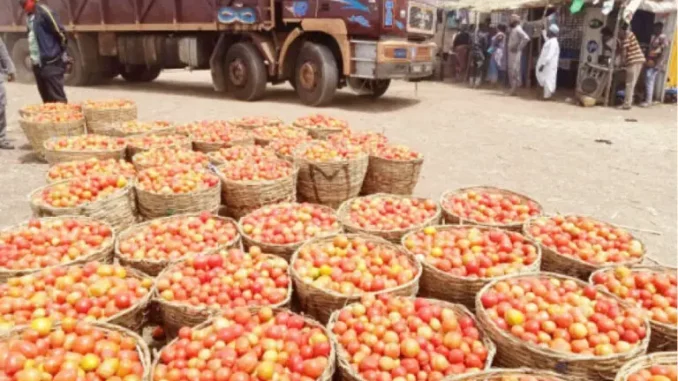
Many households and restaurants across the country are now resorting to tomato pastes and other available alternatives for their cooking as the price of fresh tomatoes has gone beyond the reach of many Nigerians.
A market survey conducted in major cities across the country showed that the price of the commodity has risen from less than N20,000 for a big basket in the last few weeks to around N70,000, depending on the market and location.
Reports by our correspondents showed that in states where tomatoes are cultivated, including Kano, Katsina and Benue states, the price of the commodity has risen from N17,000–N20,000 a basket to N40,000-N45,000.
READ ALSO:Traditional rulers reject move to amend Oyo chieftaincy law
On the other hand, in Abuja, Kwara, Oyo, Rivers, Lagos and Enugu states, the price has risen to as high as N70,000, pushing many households and restaurants to the edge. The size of the baskets is about the same across most of the markets.
While farmers are attributing the surge to high production costs, pest attacks and off-season scarcity, agricultural experts are instead calling for extensive research that will lead to the availability of water-resistant seeds to enable farmers to plant all year round, including during the rainy season.
For many households, the current price of tomatoes is beyond their reach, while for restaurants, it is eating into their profits. They said they are now forced to resort to tomato paste, which price is also going up.
READ ALSO:INSIDE LIFE: Mother dies separating two sons’ fight in Abuja
A report from Kwara State also showed how farmers and residents are lamenting the rise in the price of tomatoes since last week.
Farmers and marketers in the state also attributed the current price hike to pest attacks on tomato farms, the cost of production, and transportation.
Daily Trust observed that a big basket of the produce, which was sold for about N20,000 a few months ago, is now sold for between N57,000 and N58,000.
While some residents have since devised other means to cushion the effect on households and families, others are calling on the government to put in place programmes and policies that will reduce the cost of production.
READ ALSO:Ogun government threatens to close down eateries over environmental pollution
DRIED TOMATO TO THE RESCUE
Mrs Lateeah Abdullahi said in response to the situation, various methods have been adopted.
“Some of us now dry the tomatoes when they’re surplus and soak them in water before using them during scarcity. Sometimes, we cook it after grinding it until it becomes a thick paste which we then pour into bottles.
“This process can survive without electricity for a considerable length of time. The only thing is that it loses its fresh taste. We also switch to canned tomatoes as a buffer.
“With this, I can use around N200-N300 to prepare a meal for a family of five, like mine, instead of N500 or more for normal tomatoes, which we even still had to manage,” he noted.
READ ALSO:BODE GEORGE softens hardline on TINUBU, gives condition for reconciliation
Mama Aisha, who has been in the tomato business for decades, attributed the high cost to pest attacks in farms “around Kano and Dutse, where we get the ‘arewa’ supply from.
“What we learnt was that the present situation is due to pest attacks on the tomato farms in these communities.
“Ordinarily, the commodity becomes expensive due to the non-availability of the Arewa supply, and we fill the gap with Yoruba produce from Odooba in Ogbomoso and Asa until September, when we begin to get supply from the North.
“Now, instead of 10 trucks of tomatoes, what you have are a few minibuses of the produce. You sell according to what you buy.
“Since this week, the price of a basket of tomatoes has hovered around N47,000 to N65,000, depending on the quality and sizes.
“Four years ago, we bought a basket for N75,000 due to the same issue of pest attacks. But we just hope it will come down now,” she noted.
READ ALSO:INSIDE LIFE:Corps member rapes 20-year-old girl (READ FULL DETAILS)
Umar Mahmud Aboki, a farmer and Kwara State chairman of the All Farmers Association of Nigeria (AFAN) said,
“Increase in the price of production has affected the price of tomatoes.
“The high cost of production and inflation are major factors as prices of farm chemicals and fertilisers have tripled.
“Before, on our farms, we employed labourers and bought motorcycles for them for around N280,000. Now that has gone up to N500,000,” Aboki said.
READ ALSO:WE are unaware of Buhari’s approval for Emefiele to study abroad – PRESIDENCY
Daily Trust gathered from the markets that a basket of tomatoes is now sold at between N40,000 and N45,000, which is over 100 per cent higher than it was sold within the last two weeks when it went for N15,000.
The situation is also forcing women to resort to dried tomatoes and tomato paste.

Leave a Reply